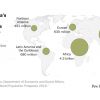-
 +23 +1
+23 +1The world's baby shortfall is so bad that the labor shortage will last for years, major employment firms predict
“Demographic shifts” can mean many things. The composition of a body of people—median age, ethnic makeup, and more—all fall into the category. But in the context of the labor shortage that has gripped the world economy since the pandemic began, it has coincided with one of Elon Musk’s big worries: The world isn’t having enough babies.
-
 +16 +1
+16 +1The less intelligent are more fertile -- so why aren't humans becoming dumber over time?
A new test of 5.9 million texts spanning years 1850 to 2005 suggests that genetic factors of intelligence have been declining as environmental influences have been improving. In a new study led by Michael A. Woodley of Menie, of the Technische Universitat Chemnitz, Germany, and the Vrije Universiteit, Belgium, researchers assessed the changing prevalence of words known to be associated with intelligence. The research was published in April in the journal Frontiers in Psychology.
-
 +10 +1
+10 +1Megacity Mumbai - From slums to skyscrapers
Mumbai is a city of contrasts. Here, the super-rich and slum dwellers live side by side. As more and more luxury skyscrapers go up, slums are forced to make way for them. Conflicts ensue. So what is life like, in a megacity with 20 million inhabitants?
-
 +17 +1
+17 +1Opinion: COVID-19′s demographic fallout has begun: We have fewer babies, fewer immigrants and more trouble ahead
The COVID-19 pandemic is shifting the shape of population in countries around the world, both in lives lost and in babies not born. We are becoming fewer even faster than before. More than a year after governments closed borders, shut down businesses and ordered people to stay home, the latest data show significant declines in fertility in some countries – declines that could become permanent. At the other end of life, so many people have died prematurely that life expectancy has gone down in some countries. This pandemic will influence the demographic makeup of countries, including Canada, for years to come.
-
 +1 +1
+1 +1China’s ‘Long-Term Time Bomb’: Falling Births Stunt Population Growth
Only 12 million babies were born last year, the lowest number of births since 1961, providing fresh evidence of a looming demographic crisis that could complicate Beijing’s ambitions.
-
 +12 +1
+12 +1The U.S. Birthrate Has Dropped Again. The Pandemic May Be Accelerating the Decline.
Over all, the birthrate declined by 4 percent in 2020. Births were down most sharply in December, when babies conceived at the start of the health crisis would have been born.
-
 +13 +1
+13 +1What if China’s Birth Rate Keeps Falling?
Last May, during China’s annual “two sessions” legislative meetings, the vice governor of the northeastern Liaoning province, Chen Xiangqun, put forward a bold suggestion for solving the region’s long-term demographic decline: allowing China’s three northeastern provinces to be the first to completely lift the national family-planning restrictions that limit most couples to just two children.
-
 +18 +1
+18 +1This Century Will See Massive Shifts in the Global Population, Economy, and Power Structure
A lot of the predictions we hear about the future involve a hot, crowded planet, one where we need some serious science to figure out how to feed everyone and control rising global temperatures. The UN’s population forecast of almost 10 billion people by 2050 is widely quoted, and with it has come much conjecture about what such a world will look like. Where will all those people live? What kind of jobs will they have? What will they eat?
-
 +15 +1
+15 +1One billion people will live in insufferable heat within 50 years – study
The human cost of the climate crisis will hit harder, wider and sooner than previously believed, according to a study that shows a billion people will either be displaced or forced to endure insufferable heat for every additional 1C rise in the global temperature.
-
 +15 +1
+15 +1People no longer believe working hard will lead to a better life, survey shows
A growing sense of inequality is undermining trust in both society's institutions and capitalism, according to a long-running global survey. The 2020 Edelman Trust Barometer - now in its 20th year - has found many people no longer believe working hard will give them a better life. Despite strong economic performance, a majority of respondents in every developed market do not believe they will be better off in five years' time.
-
 +4 +1
+4 +1World population growth is expected to nearly stop by 2100
For the first time in modern history, the world’s population is expected to virtually stop growing by the end of this century.
-
 +10 +1
+10 +1India's population growth slows substantially, may 'no longer be pressing problem'
There’s heartening news on an age-old Indian problem. A report released by the United Nations Population Fund earlier this month indicates that India’s population growth rate has slowed substantially in the 2010-2019 period. According to the report, India’s population may have grown at .4 percentage points lower in the 2010-2019 period as compared to the decade between 2001 and 2011.
-
 +3 +1
+3 +1Deep Dish: Why Worry about Global Population Decline?
The world's population is expected to peak and then decline this century, reshaping everything from economic growth and immigration to government spending and climate change.
-
 +1 +1
+1 +1The U.S. Now Has More Millionaires Than Sweden Has People
The number of wealthy households in the U.S. reached a new high last year, roughly equivalent to the entire population of Sweden or Portugal. More than 10.2 million households had a net worth of $1 million to $5 million, not including the value of their primary residence, according to a survey by the Spectrem Group. That’s up 2.5 percent from 2017.
-
 +16 +1
+16 +1Japan Aims To Automate All Convenience Stores By 2025 With A New RFID Technology
Japan is one of the countries that are facing a serious shrinkage of population. There were 125 million people as of 2000, and the number is expect to go down to 88 million in 2065, due to a declining birth rate. Japan is also a unique country that relies heavily on convenience stores, which are called “konbini”. There are 55,743 convenience stores as of December 2018, according to the Japan Franchise Association and the number has been solidly increasing since 1970s.
-
 +27 +1
+27 +1The World Might Actually Run Out of People
You know the story. Despite technologies, regulations, and policies to make humanity less of a strain on the earth, people just won’t stop reproducing. By 2050 there will be 9 billion carbon-burning, plastic-polluting, calorie-consuming people on the planet. By 2100, that number will balloon to 11 billion, pushing society into a Soylent Green scenario. Such dire population predictions aren’t the stuff of sci-fi; those numbers come from one of the most trusted world authorities, the United Nations.
-
 +2 +1
+2 +1Social uncertainty weakens Latvia - The Baltic Word
Opinion - Social uncertainty weakens Latvia The latest data of the Central Statistical Bureau (CSB) show that at the beginning of 2018 population of Latvia accounted for 1 million 934 thousand, which is 15.7 thousand people fewer than a year ago.
-
 +3 +1
+3 +1Americans aren't making enough babies to replace ourselves
Americans are having fewer and fewer babies, a new government report finds. In fact, we now aren’t making enough babies to replace ourselves. For the population to reproduce itself at current numbers, the “total fertility rate” needs to be 2,100 births per 1,000 women of childbearing age over their lifetime, researchers for the Centers for Disease Control and Prevention said in their report, released early Thursday. But the latest data show a current rate of just 1,765.5 per 1,000, or 16 percent below the number needed to keep the population stable without additions through immigration.
-
 +2 +1
+2 +1We All Have Moments of Forgetfulness, But........
Well ok, forgetfulness may not be something to joke about. Or is it? I guess it depends on the person and the to the degree we forget things. For most of the population to forget things is an every day annoyance.
-
 +1 +1
+1 +1'Remarkable' global decline in fertility rates
Their report found fertility rate falls meant nearly half of countries were now facing a "baby bust" - meaning there are insufficient children to maintain their population size. The researchers said the findings were a "huge surprise", and there would be profound consequences for societies with "more grandparents than grandchildren". The study, published in the Lancet, followed trends in every country from 1950 to 2017.
Submit a link
Start a discussion




















